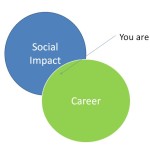Career transition? Focus on your mission not your resume.
Career transition? Focus on your mission not your resume.
Most people start a career change by trying to re-write their resume. Having interviewed over 10,000 individuals in the nonprofit arena, I can’t tell you how important it is to start with your ideal career mission. Don’t get me wrong. A well written resume is an important step in the career transition process, but it should not lead your career change. A more effective and sustainable alternative is to start with your mission or purpose.
What is your mission?
Choosing your mission is a journey and starts with identifying what values and interests are MOST important to you and what you enjoy doing the most. This does not have to be a lengthy self-assessment but rather a thoughtful look at what has been most important to you in your life. What do you absolutely love doing? What brings joy to you every time you do it? What do you like to teach to others?
Two major factors to focus on while finding the right mission for you:
1. Cultural fit
2. Interests
Cultural Fit:
When you work in a culture where you are extremely passionate about the goals and motivated to make a difference, you will often find the organizational fit to be a great match as well.
One of the biggest questions to ask yourself is “do I like a larger organization or a smaller one?” Many career-changers have been working in a large company and may want to work in more intimate environment. My experience has shown that smaller nonprofits are more flexible with career-changers than larger nonprofits. Many larger nonprofits want someone who has worked in the sector before and are less interested in doing on-the-job training.
Interests:
Some people ask “Why not start with my existing skills when making a career change to the nonprofit sector?” Richard Nelson Bolles, the author of “What Color Is Your Parachute?”–addresses this issue in the “Parachute” workbook. He states: “experience has shown to be true: If it is a skill you do well, you will generally enjoy it. If it is a skill you enjoy, it is generally because you do it well.”
When making a career transition it is much more useful to ask yourself “do I enjoy doing it?” rather than “Am I capable of doing it?”
Interests are a key factor when making the transition to the social sector. What do you love doing? What do you want to stay away from or avoid? What makes you fulfilled or extremely happy? Think of past volunteer experiences that gave you a sense of purpose or pride. Think of issues that have touched you personally.
As you think about these interests, identify which populations or causes really speak to you. For example if you love working with children, then Big Brother Big Sisters would be a great organization to pursue. If cancer has touched your family, you are more likely to be interested in finding a cure for breast cancer, so the Susan G. Komen Foundation would be a great fit.
Say hello to Kim… (Does this sound like you?)
A career coach who is dedicated to the nonprofit sector is ideal to help accelerate your career-change. That is what a client of mine, Kim, discovered when she was laid off in from her IT job in 2009 after working there for over eight years.
Kim knew this was the just the opportunity to jump into a more fulfilling career in nonprofits but was getting very frustrated with the lack of results from submitting resumes and not receiving a single interview request.
Kim had recently volunteered abroad for a human services organization and was able to use her gift of languages to help youth. As we spoke about this experience, Kim explained why this experience was so special to her. It turns out Kim had previously been a tutor and peer-mentor as a teen. Kim had mentored a student and recalls what a life-changing experience it had been
One of the only things Kim was sure about from her experience in the corporate world was that she really enjoyed being part of a small team. She really enjoyed the strong bonds that were built and knew she would like a similar culture in her next job.
After a bit more of research and probing, we came to focus in on human service nonprofits that focused on serving the growing Asian community in the area. We knew these organizations, being community-based, were smaller in size so they offered Kim the close-knit camaraderie she craved. In addition, they were more likely to appreciate Kim’s language skills and recent volunteer experience.
Today Kim is a case worker for a local human service organization serving the Asian community. This position focuses on a population she cares deeply about and is energized to serve. Because it is a small organization, Kim has close bonds with her co-workers. These small yet diverse groups of peers all have the common goal to help and serve this Asian community. The multicultural requirement of the job allows Kim to use her language gifts and knowledge gained from past experiences abroad. Kim has found her career path for social impact by focusing on what she loves and who she wants to serve. Every day, she is building her character and value through paid nonprofit experience and learning how to make a difference in the daily lives of the population she works to serve.
Do you need help with your career transition? Contact me here for a free consultation.




